University Business Law Case Study: Contractual Disputes
VerifiedAdded on 2023/03/20
|5
|1100
|98
Case Study
AI Summary
This business law case study examines a dispute between a buyer and a seller concerning the sale of a courier van. The analysis delves into the formation of a valid contract, including the elements of offer, acceptance, and consideration. The case explores whether the initial advertisement constituted an invitation to treat and the subsequent offer made by the buyer. It also addresses the concept of an option contract and its breach when the seller sells the van to another party. The study evaluates the buyer's potential claims, the seller's available defenses, and the likelihood of the buyer's success. Furthermore, it examines the remedies available to the buyer, focusing on the principles of damages for breach of contract, considering the position of the aggrieved party had the breach not occurred. The analysis references relevant legal precedents to support its arguments and conclusions.
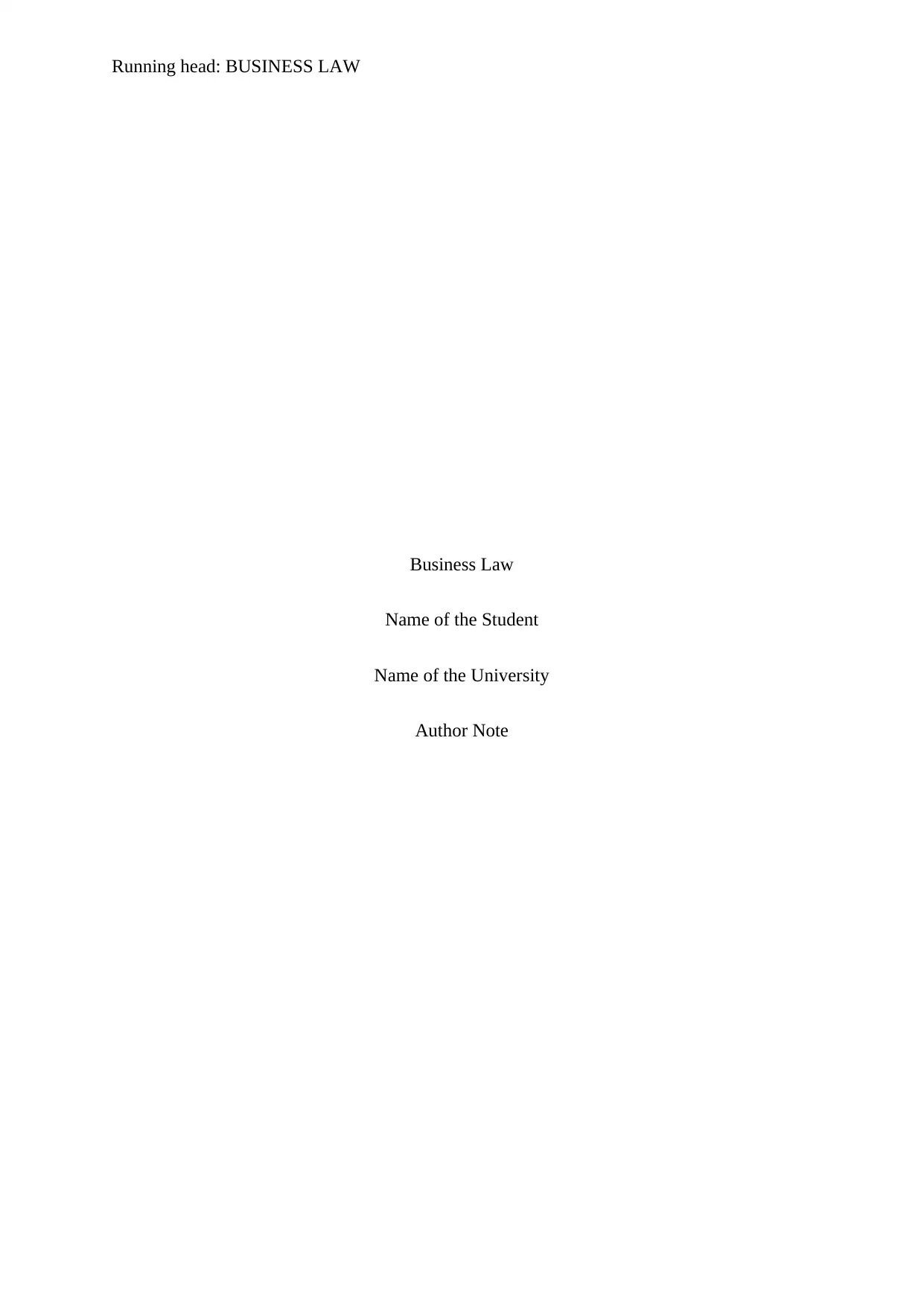
Running head: BUSINESS LAW
Business Law
Name of the Student
Name of the University
Author Note
Business Law
Name of the Student
Name of the University
Author Note
Paraphrase This Document
Need a fresh take? Get an instant paraphrase of this document with our AI Paraphraser
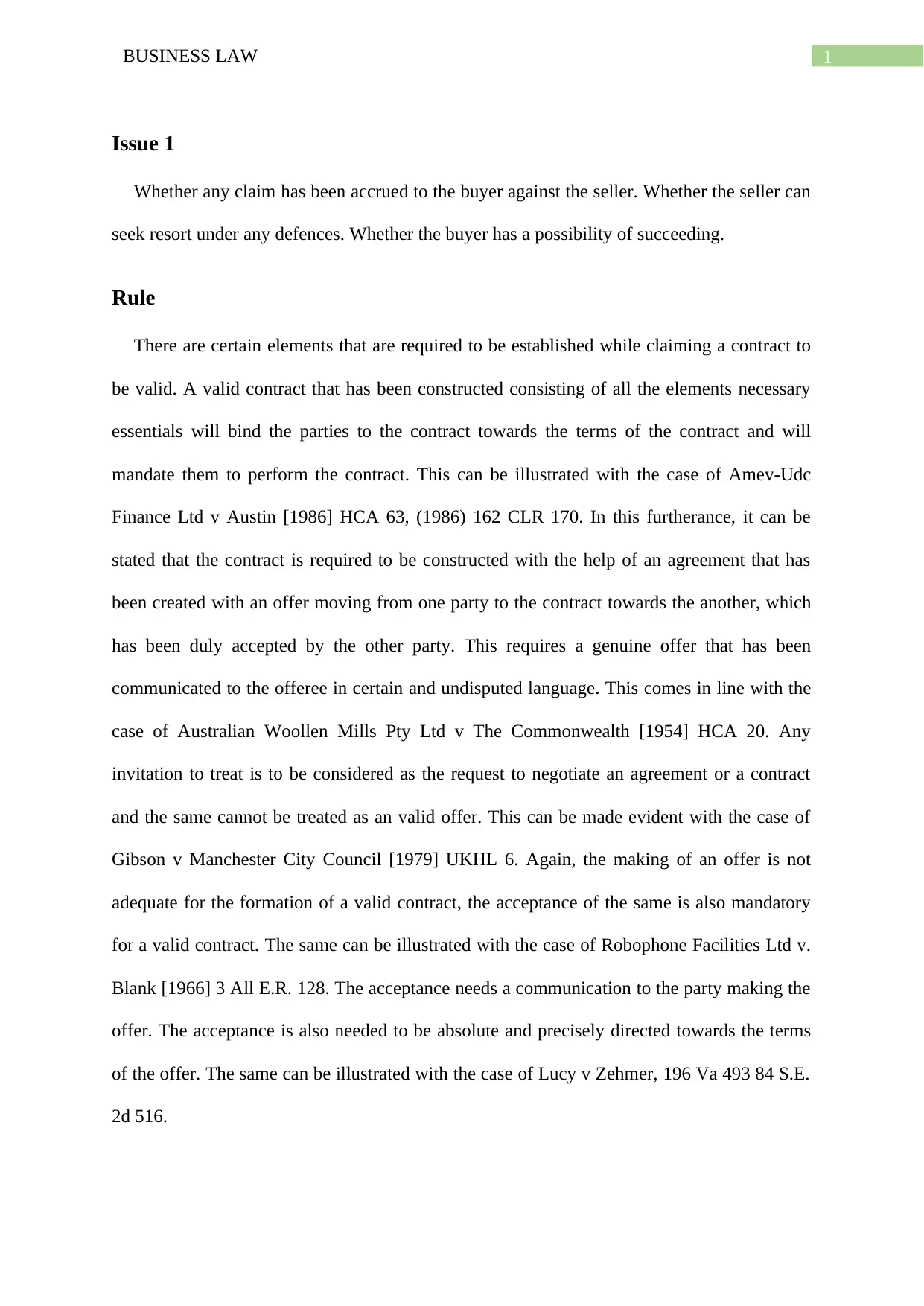
1BUSINESS LAW
Issue 1
Whether any claim has been accrued to the buyer against the seller. Whether the seller can
seek resort under any defences. Whether the buyer has a possibility of succeeding.
Rule
There are certain elements that are required to be established while claiming a contract to
be valid. A valid contract that has been constructed consisting of all the elements necessary
essentials will bind the parties to the contract towards the terms of the contract and will
mandate them to perform the contract. This can be illustrated with the case of Amev-Udc
Finance Ltd v Austin [1986] HCA 63, (1986) 162 CLR 170. In this furtherance, it can be
stated that the contract is required to be constructed with the help of an agreement that has
been created with an offer moving from one party to the contract towards the another, which
has been duly accepted by the other party. This requires a genuine offer that has been
communicated to the offeree in certain and undisputed language. This comes in line with the
case of Australian Woollen Mills Pty Ltd v The Commonwealth [1954] HCA 20. Any
invitation to treat is to be considered as the request to negotiate an agreement or a contract
and the same cannot be treated as an valid offer. This can be made evident with the case of
Gibson v Manchester City Council [1979] UKHL 6. Again, the making of an offer is not
adequate for the formation of a valid contract, the acceptance of the same is also mandatory
for a valid contract. The same can be illustrated with the case of Robophone Facilities Ltd v.
Blank [1966] 3 All E.R. 128. The acceptance needs a communication to the party making the
offer. The acceptance is also needed to be absolute and precisely directed towards the terms
of the offer. The same can be illustrated with the case of Lucy v Zehmer, 196 Va 493 84 S.E.
2d 516.
Issue 1
Whether any claim has been accrued to the buyer against the seller. Whether the seller can
seek resort under any defences. Whether the buyer has a possibility of succeeding.
Rule
There are certain elements that are required to be established while claiming a contract to
be valid. A valid contract that has been constructed consisting of all the elements necessary
essentials will bind the parties to the contract towards the terms of the contract and will
mandate them to perform the contract. This can be illustrated with the case of Amev-Udc
Finance Ltd v Austin [1986] HCA 63, (1986) 162 CLR 170. In this furtherance, it can be
stated that the contract is required to be constructed with the help of an agreement that has
been created with an offer moving from one party to the contract towards the another, which
has been duly accepted by the other party. This requires a genuine offer that has been
communicated to the offeree in certain and undisputed language. This comes in line with the
case of Australian Woollen Mills Pty Ltd v The Commonwealth [1954] HCA 20. Any
invitation to treat is to be considered as the request to negotiate an agreement or a contract
and the same cannot be treated as an valid offer. This can be made evident with the case of
Gibson v Manchester City Council [1979] UKHL 6. Again, the making of an offer is not
adequate for the formation of a valid contract, the acceptance of the same is also mandatory
for a valid contract. The same can be illustrated with the case of Robophone Facilities Ltd v.
Blank [1966] 3 All E.R. 128. The acceptance needs a communication to the party making the
offer. The acceptance is also needed to be absolute and precisely directed towards the terms
of the offer. The same can be illustrated with the case of Lucy v Zehmer, 196 Va 493 84 S.E.
2d 516.
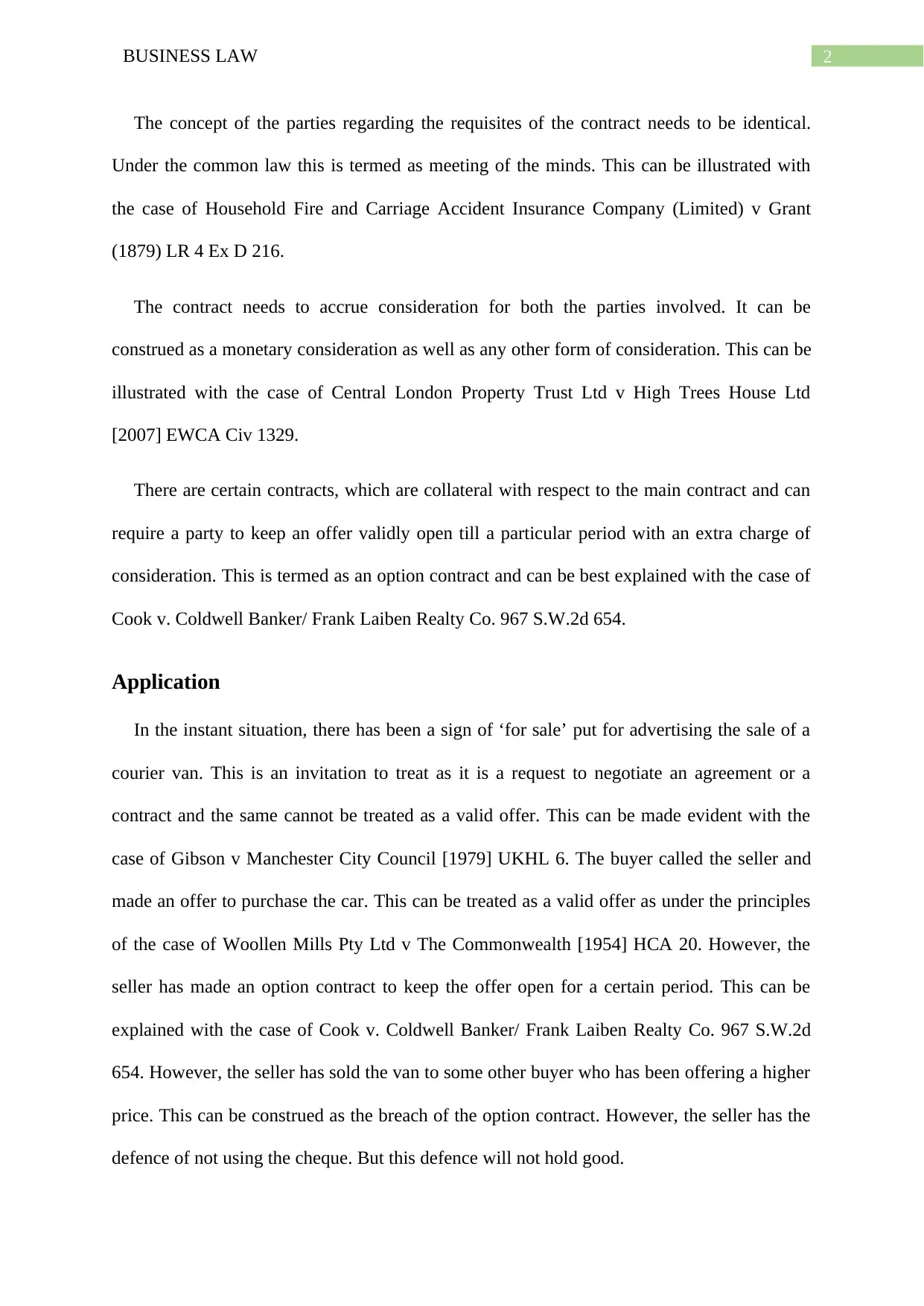
2BUSINESS LAW
The concept of the parties regarding the requisites of the contract needs to be identical.
Under the common law this is termed as meeting of the minds. This can be illustrated with
the case of Household Fire and Carriage Accident Insurance Company (Limited) v Grant
(1879) LR 4 Ex D 216.
The contract needs to accrue consideration for both the parties involved. It can be
construed as a monetary consideration as well as any other form of consideration. This can be
illustrated with the case of Central London Property Trust Ltd v High Trees House Ltd
[2007] EWCA Civ 1329.
There are certain contracts, which are collateral with respect to the main contract and can
require a party to keep an offer validly open till a particular period with an extra charge of
consideration. This is termed as an option contract and can be best explained with the case of
Cook v. Coldwell Banker/ Frank Laiben Realty Co. 967 S.W.2d 654.
Application
In the instant situation, there has been a sign of ‘for sale’ put for advertising the sale of a
courier van. This is an invitation to treat as it is a request to negotiate an agreement or a
contract and the same cannot be treated as a valid offer. This can be made evident with the
case of Gibson v Manchester City Council [1979] UKHL 6. The buyer called the seller and
made an offer to purchase the car. This can be treated as a valid offer as under the principles
of the case of Woollen Mills Pty Ltd v The Commonwealth [1954] HCA 20. However, the
seller has made an option contract to keep the offer open for a certain period. This can be
explained with the case of Cook v. Coldwell Banker/ Frank Laiben Realty Co. 967 S.W.2d
654. However, the seller has sold the van to some other buyer who has been offering a higher
price. This can be construed as the breach of the option contract. However, the seller has the
defence of not using the cheque. But this defence will not hold good.
The concept of the parties regarding the requisites of the contract needs to be identical.
Under the common law this is termed as meeting of the minds. This can be illustrated with
the case of Household Fire and Carriage Accident Insurance Company (Limited) v Grant
(1879) LR 4 Ex D 216.
The contract needs to accrue consideration for both the parties involved. It can be
construed as a monetary consideration as well as any other form of consideration. This can be
illustrated with the case of Central London Property Trust Ltd v High Trees House Ltd
[2007] EWCA Civ 1329.
There are certain contracts, which are collateral with respect to the main contract and can
require a party to keep an offer validly open till a particular period with an extra charge of
consideration. This is termed as an option contract and can be best explained with the case of
Cook v. Coldwell Banker/ Frank Laiben Realty Co. 967 S.W.2d 654.
Application
In the instant situation, there has been a sign of ‘for sale’ put for advertising the sale of a
courier van. This is an invitation to treat as it is a request to negotiate an agreement or a
contract and the same cannot be treated as a valid offer. This can be made evident with the
case of Gibson v Manchester City Council [1979] UKHL 6. The buyer called the seller and
made an offer to purchase the car. This can be treated as a valid offer as under the principles
of the case of Woollen Mills Pty Ltd v The Commonwealth [1954] HCA 20. However, the
seller has made an option contract to keep the offer open for a certain period. This can be
explained with the case of Cook v. Coldwell Banker/ Frank Laiben Realty Co. 967 S.W.2d
654. However, the seller has sold the van to some other buyer who has been offering a higher
price. This can be construed as the breach of the option contract. However, the seller has the
defence of not using the cheque. But this defence will not hold good.
⊘ This is a preview!⊘
Do you want full access?
Subscribe today to unlock all pages.

Trusted by 1+ million students worldwide
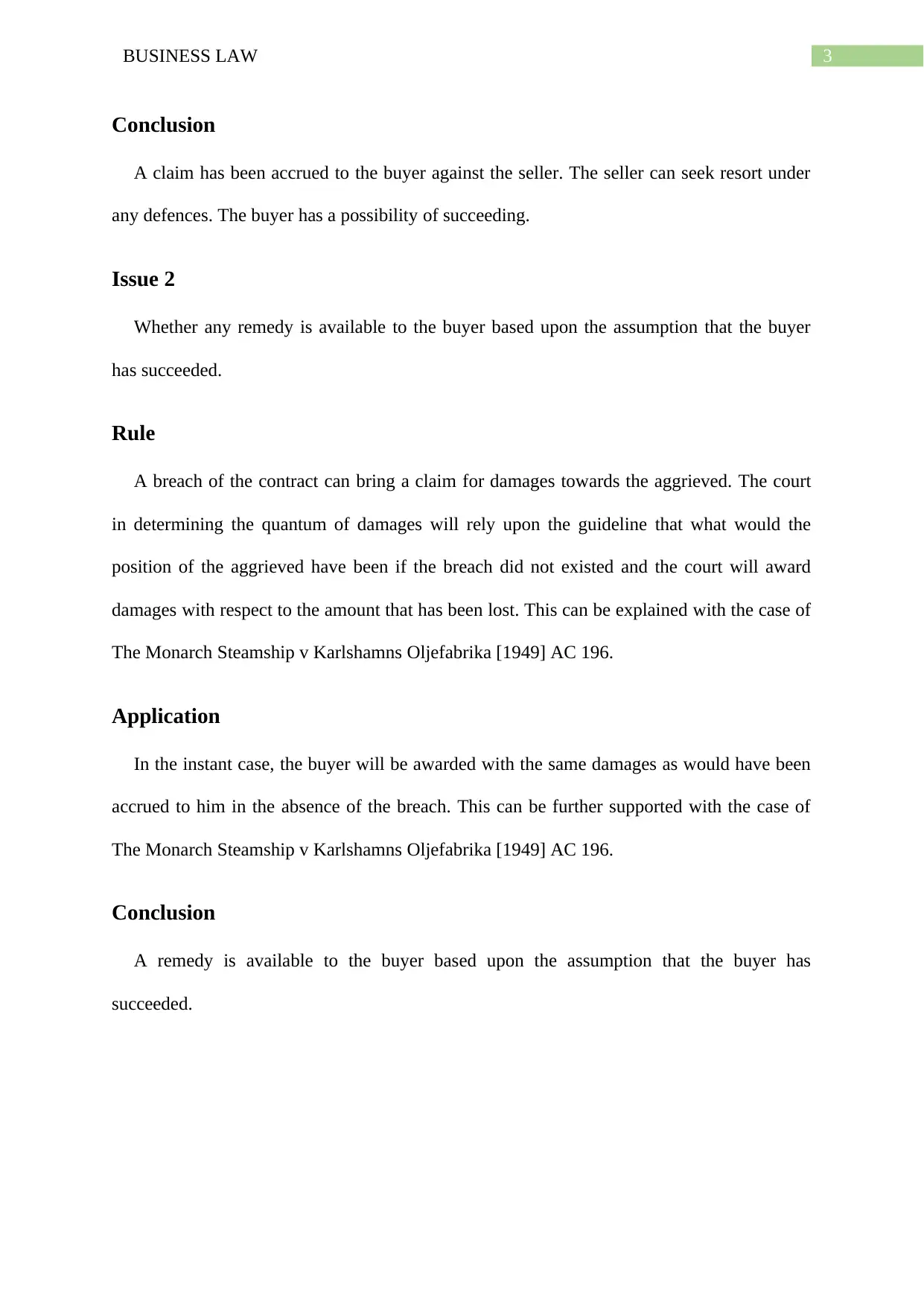
3BUSINESS LAW
Conclusion
A claim has been accrued to the buyer against the seller. The seller can seek resort under
any defences. The buyer has a possibility of succeeding.
Issue 2
Whether any remedy is available to the buyer based upon the assumption that the buyer
has succeeded.
Rule
A breach of the contract can bring a claim for damages towards the aggrieved. The court
in determining the quantum of damages will rely upon the guideline that what would the
position of the aggrieved have been if the breach did not existed and the court will award
damages with respect to the amount that has been lost. This can be explained with the case of
The Monarch Steamship v Karlshamns Oljefabrika [1949] AC 196.
Application
In the instant case, the buyer will be awarded with the same damages as would have been
accrued to him in the absence of the breach. This can be further supported with the case of
The Monarch Steamship v Karlshamns Oljefabrika [1949] AC 196.
Conclusion
A remedy is available to the buyer based upon the assumption that the buyer has
succeeded.
Conclusion
A claim has been accrued to the buyer against the seller. The seller can seek resort under
any defences. The buyer has a possibility of succeeding.
Issue 2
Whether any remedy is available to the buyer based upon the assumption that the buyer
has succeeded.
Rule
A breach of the contract can bring a claim for damages towards the aggrieved. The court
in determining the quantum of damages will rely upon the guideline that what would the
position of the aggrieved have been if the breach did not existed and the court will award
damages with respect to the amount that has been lost. This can be explained with the case of
The Monarch Steamship v Karlshamns Oljefabrika [1949] AC 196.
Application
In the instant case, the buyer will be awarded with the same damages as would have been
accrued to him in the absence of the breach. This can be further supported with the case of
The Monarch Steamship v Karlshamns Oljefabrika [1949] AC 196.
Conclusion
A remedy is available to the buyer based upon the assumption that the buyer has
succeeded.
Paraphrase This Document
Need a fresh take? Get an instant paraphrase of this document with our AI Paraphraser
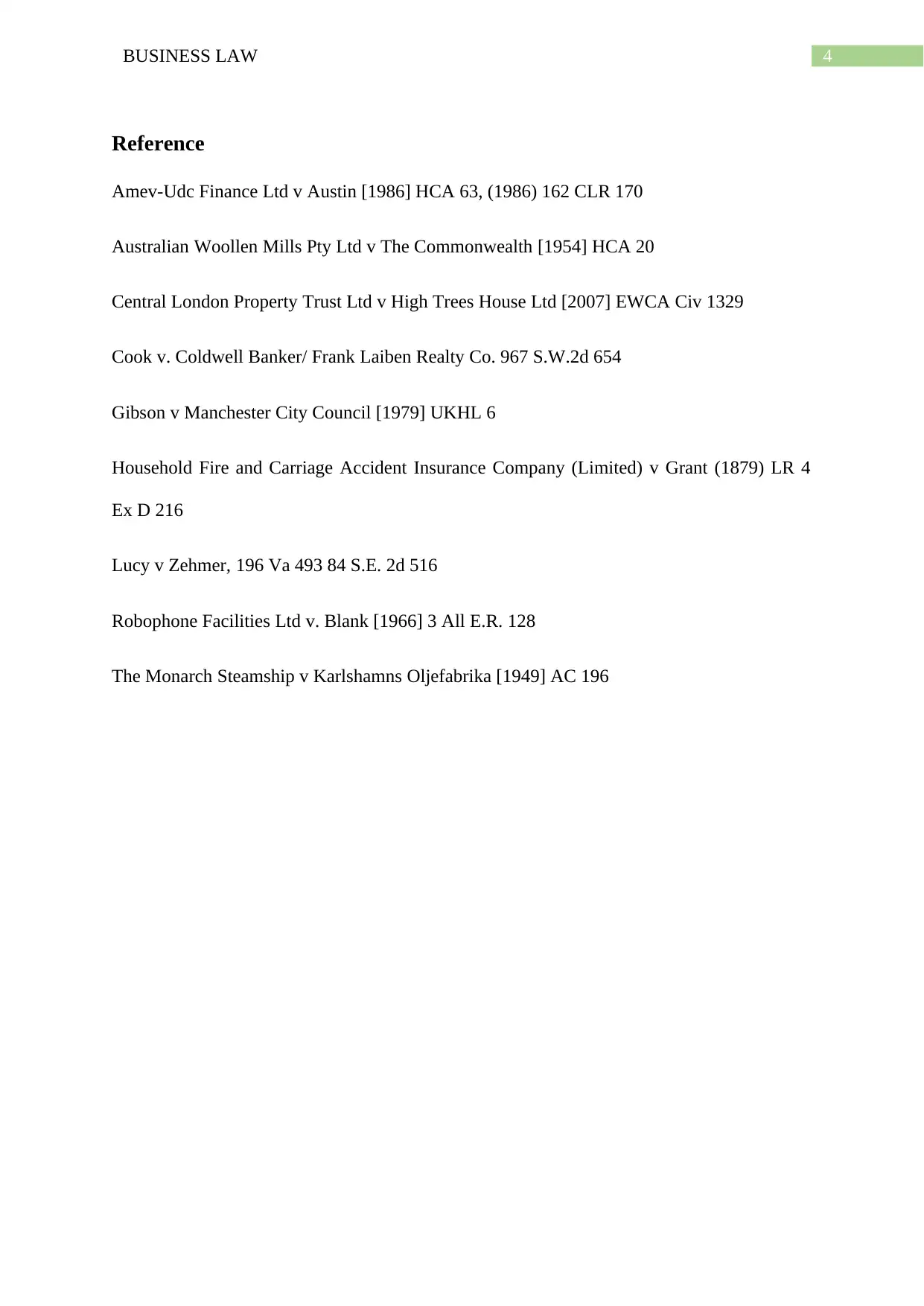
4BUSINESS LAW
Reference
Amev-Udc Finance Ltd v Austin [1986] HCA 63, (1986) 162 CLR 170
Australian Woollen Mills Pty Ltd v The Commonwealth [1954] HCA 20
Central London Property Trust Ltd v High Trees House Ltd [2007] EWCA Civ 1329
Cook v. Coldwell Banker/ Frank Laiben Realty Co. 967 S.W.2d 654
Gibson v Manchester City Council [1979] UKHL 6
Household Fire and Carriage Accident Insurance Company (Limited) v Grant (1879) LR 4
Ex D 216
Lucy v Zehmer, 196 Va 493 84 S.E. 2d 516
Robophone Facilities Ltd v. Blank [1966] 3 All E.R. 128
The Monarch Steamship v Karlshamns Oljefabrika [1949] AC 196
Reference
Amev-Udc Finance Ltd v Austin [1986] HCA 63, (1986) 162 CLR 170
Australian Woollen Mills Pty Ltd v The Commonwealth [1954] HCA 20
Central London Property Trust Ltd v High Trees House Ltd [2007] EWCA Civ 1329
Cook v. Coldwell Banker/ Frank Laiben Realty Co. 967 S.W.2d 654
Gibson v Manchester City Council [1979] UKHL 6
Household Fire and Carriage Accident Insurance Company (Limited) v Grant (1879) LR 4
Ex D 216
Lucy v Zehmer, 196 Va 493 84 S.E. 2d 516
Robophone Facilities Ltd v. Blank [1966] 3 All E.R. 128
The Monarch Steamship v Karlshamns Oljefabrika [1949] AC 196
1 out of 5
Related Documents
Your All-in-One AI-Powered Toolkit for Academic Success.
+13062052269
info@desklib.com
Available 24*7 on WhatsApp / Email
![[object Object]](/_next/static/media/star-bottom.7253800d.svg)
Unlock your academic potential
Copyright © 2020–2026 A2Z Services. All Rights Reserved. Developed and managed by ZUCOL.





